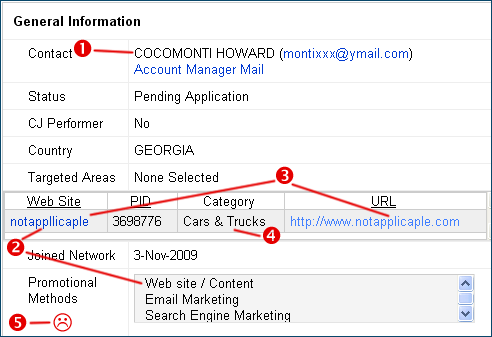Here is a profile screenshot for an affiliate who has applied into one of the affiliate programs I know:

This application got declined on the following 5 reasons. These are the things that are very frequently happening with affiliate applications, and I think it is important to devote my today’s post to it. If you want your affiliate application to be declined, follow the below 5-step advice:
1. Use a made-up name instead of your real one
Coming from a linguistic background, and being born in the Soviet Union, it just makes me smile when I see a Georgia resident bearing such a name. A simple research helps me undertand where they got the name from. There is a person with this name living in Atlanta, Georgia. Additionally, it is apparent that the “affiliate” has confused the state with the country, thereby revealing that he/she is probably neither Cocomonti, nor a resident of Georgia.
2. Assume that website is not necessary
I would argue that it always is essential for an affiliate to have a website (or at least a page) where he/she would explain to advertisers the marketing methods they are planning on employing to promote advertisers. The explanation can be however general, or however detailed you want, but it is hard to imagine that an effective online marketer could have no website whatsoever. The affiliate-stated relevancy of the “Web site” question is all the more suspicious in light of the fact that they have chosen “Web site / Content” as one of the promotion methods that they are going to use. How when you don’t even have a website?
3. Make spelling mistakes
As one can see from the above screenshot, the word “applicable” has been spelled two different ways: neither one of which is correct.
4. List yourself in an random category
Not all affiliate networks require affiliates to place their websites into categories. Commission Junction (which is the network on which this application has happened) does, and this affiliate has chosen “Cars & Trucks” for his notapplicaple.com nonexistent website. Any randomly filled-out information (name, location, website, categorization, etc) may be taken for an attempt to deceive an affiliate program manager.
5. Ignore emails asking for clarification of intent
If you have received an email from an affiliate program manager who wants to clarify how exactly you are envisaging working with their affiliate program, a non-reply is the worst thing an affiliate can do.
I could have also mentioned the free email account, but many affiliates choose to do this for obvious reasons, and I’m certainly not going to recommend declining an affiliate application based just on that.
Good to see a post on this issue from another viewpoint – forums are full of posts from affiliates complaining about not getting accepted (although I’d say very few have put in an application of this sort of rubbish magnitude).
Whilst this is probably an extreme example of an application the point that its important to use the chance to communicate as much as possible about your intent and means to promote the programme is well made!
That said, too many merchants and affiliate managers seem to have very twitchy “decline” fingers, particularly when affiliates are limited by a network as to how many sites they can list. Many tend to decline first and ask questions later when presented with a site that doesn’t immediately appear to be relevant.
Kristy, you bring up a point which is worth an article of its own — merchants/AMs with stringent affiliate approval criteria. Some of these criteria are even more unjust than they are stringent. I can name dozens of merchants (both top brand names, and lesser known ones) that make the wrong factors their key points of approving or denying an affiliate application.
Since the above-quoted affiliate application example comes from CJ, it is worth mentioning that multiple CJ-based merchants judge affiliates by their 5-bar ranking. If you’re below a certain level of ranking (4 or 5 bars), you get an automatic decline. And the problem is only partly with the unjust approach. The bigger problem, which none of these merchants/AMs realize, is the fact that by so doing they are harming their own affiliate programs. I’ve been 1-bar and newbie affiliates grow to 4 bars withing one month!
Education (merchant education, that is) is desperately lacking.
Geno, you’re spot on! I couldn’t agree more with your assessment of this kind of affiliate application!
Thank you, Trisha.